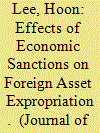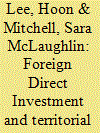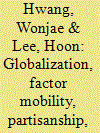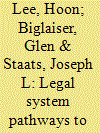|
|
|
Sort Order |
|
|
|
Items / Page
|
|
|
|
|
|
|
| Srl | Item |
| 1 |
ID:
152896


|
|
|
|
|
| Summary/Abstract |
Existing studies argue that armed conflict reduces foreign direct investment (FDI) or, following rational expectations theory, should not affect FDI. In this paper, I offer a new theory on how armed conflict affects FDI, which encompasses the interaction between political risk and market conditions and provides a systematic explanation for investors’ divergent responses including an opportunistic behavior. To do so, I present a formal model focusing on a commodity's price, which is a key to investors’ profits and is also influenced by political risk. The model demonstrates that investors do not necessarily reduce FDI against political risk if armed conflict is expected to increase profit by increasing commodity prices, ceteris paribus. Statistical analysis of 50 countries that received FDI in the petroleum sector from 1980 to 2006 reveals that armed conflict (intrastate and interstate) reduces FDI in petroleum. However, it also shows that the effect of armed conflict on FDI in petroleum varies depending on oil prices. Consistent with the predictions, I find that investors do not decrease investment as oil prices get higher. An additional analysis on US FDI in petroleum from 1982 to 2006 also confirms the finding. This insight adds a new dimension to a current debate about the relationship between conflict and FDI.
|
|
|
|
|
|
|
|
|
|
|
|
|
|
|
|
| 2 |
ID:
189008


|
|
|
|
|
| Summary/Abstract |
Studies suggest that home countries impose economic sanctions following host state expropriation of home firms. However, and not addressed in the empirical literature, is the possibility that sanctions lead targeted countries to nationalize firms from sender countries. Using bilateral expropriation data from 1985 to 2010, and controlling for endogeneity issues, we find that sanctions significantly increase expropriation risk, encouraging targeted states to inflict pain in a reciprocal manner on sender countries. Expropriations also enable targeted nations to acquire economic assets from foreign firms, undermining the restricting goals of sanctioning states, and provide opportunities for leaders to show political resolve at home by standing up to senders. Our results are robust using monadic or dyadic data and different statistical methods, indicating another sanction-busting strategy used by targeted countries.
|
|
|
|
|
|
|
|
|
|
|
|
|
|
|
|
| 3 |
ID:
158846


|
|
|
|
|
| Summary/Abstract |
Does trade reduce conflict even when states compete over high-salience issues (e.g., territory)? Despite recent challenges to liberal peace theory, few studies have examined whether the trade-reduces-conflict argument is robust to particularly conflict prone issues like territory. We evaluate whether trade reduces not only violent conflict over territory, but also the incentives to use specific power politics behaviors (e.g., arms races) associated both with territorial competition and a higher probability of war. As key causal mechanisms, we rely on opportunity costs and the ability to credibly signal information that increased trade generates, reducing states’ incentives to engage in violent conflict and arms races. Empirical analyses, using multiple sample populations and different measures of key indicators and outcomes, are consistent with our expectations. The results suggest that trade may reduce conflict both directly, by decreasing the likelihood of militarized disputes, and indirectly, by reducing the likelihood of power politics strategies like arms races, thought to increase the likelihood of war.
|
|
|
|
|
|
|
|
|
|
|
|
|
|
|
|
| 4 |
ID:
113951


|
|
|
|
|
| Publication |
2012.
|
| Summary/Abstract |
This study evaluates the relationship between foreign direct investment (FDI) and interstate conflict, focusing on four prominent causal mechanisms: the declining benefits of territorial conquest, increasing preference similarity, increasing opportunity costs of violence, and improved information signaling. Empirical analyses show that new territorial issues are less likely to arise as global levels of FDI increase, although monadic and bilateral FDI flows have no effect on states' decisions to start new issue claims. Higher bilateral FDI flows between two disputants significantly reduce the chances for escalation to high levels of violence over issues and improve the chances for peaceful management. Increasing global levels of FDI also reduce the chances for severe militarized conflicts. Opportunity costs are an important mechanism linking FDI and states' conflict management practices, as the pacifying effect of bilateral and monadic FDI on militarized conflict becomes stronger in dyads with a history of militarization over the issues at stake.
|
|
|
|
|
|
|
|
|
|
|
|
|
|
|
|
| 5 |
ID:
131001


|
|
|
|
|
| Publication |
2014.
|
| Summary/Abstract |
This paper examines the relationship between economic globalization, factor mobility, government partisanship, and the relative budgetary salience of two different instruments of compensation policies: social welfare spending and industrial subsidy provision. While welfare spending directly benefits labor, industrial subsidies benefit both capital owners and labor along the sectoral line. Based on both factoral and sectoral models of trade, we theoretically argue and empirically show that governments are more likely to use welfare politics as compensation policies if free trade generates class-based interests in the society, and subsidy politics if trade openness promotes industry-based interests. We also argue that the interactions of the three variables are contingent on government partisanship. When non-class-based interests are salient as a consequence of trade openness, left-wing governments are likely to focus on welfare politics while right-wing governments favor provision of subsidies. However, when class-based interests are salient, even right-wing governments behave similarly to left-wing governments, favoring welfare spending over subsidies as the key compensation policy. In the analysis of compensation policies in the OECD countries between 1980 and 2001, the test results confirm our expectation
|
|
|
|
|
|
|
|
|
|
|
|
|
|
|
|
| 6 |
ID:
135899


|
|
|
|
|
| Summary/Abstract |
Building on recent works showing the role that legal institutions can play in attracting foreign capital (Jensen 2003, 2006; Li and Resnick 2003; Li 2006; Biglaiser and Staats 2010; Staats and Biglaiser 2012), and drawing on insights obtained from Powell and Rickard (2010), we use panel data for 114 developing countries from 1970 to 2007 to demonstrate that developing countries with common law legal systems attract greater foreign direct investment (FDI) than countries that have civil law or Islamic legal systems because common law systems are more inclined to promote the rule of law and protect property rights and can be understood to provide more efficiency in the law, better contract enforcement, more judicial autonomy, and more market-oriented regulations.
|
|
|
|
|
|
|
|
|
|
|
|
|
|
|
|
|
|
|
|
|